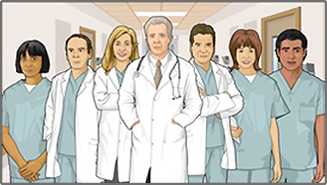Swelling
Swelling is the enlargement of organs, skin, or other body parts. It is caused by a buildup of fluid in the tissues. The extra fluid can lead to a rapid increase in weight over a short period of time (days to weeks).
Swelling can occur all over the body (generalized) or only in one part of the body (localized).
Considerations
Slight swelling (edema) of the lower legs is common in warm summer months, especially if a person has been standing or walking a lot.
General swelling, or massive edema (also called anasarca), is a common sign in people who are very sick. Although slight edema may be hard to detect, a large amount of swelling is obvious.
Edema is described as pitting or non-pitting.
- Pitting edema leaves a dent in the skin after you press the area with a finger for about 5 seconds. The dent will slowly fill back in.
- Non-pitting edema does not leave this type of dent when pressing on the swollen area.
Causes
Swelling can be caused by any of the following:
- Acute glomerulonephritis (a kidney disease)
- Burns, including sunburn
- Chronic kidney disease
Chronic kidney disease
Chronic kidney disease is the slow loss of kidney function over time. The main job of the kidneys is to remove wastes and excess water from the body...
 ImageRead Article Now Book Mark Article
ImageRead Article Now Book Mark Article - Heart failure
Heart failure
Heart failure is a condition in which the heart is no longer able to pump oxygen-rich blood to the rest of the body efficiently. This causes symptom...
 ImageRead Article Now Book Mark Article
ImageRead Article Now Book Mark Article - Liver failure from cirrhosis or other liver disease
Cirrhosis
Cirrhosis is scarring of the liver and poor liver function. It is the last stage of chronic liver disease.
 ImageRead Article Now Book Mark Article
ImageRead Article Now Book Mark Article - Nephrotic syndrome (a kidney disease)
- Poor nutrition
- Pregnancy
- Thyroid disease
- Too little albumin in the blood (hypoalbuminemia)
- Too much salt or sodium
- Use of certain medicines, such as corticosteroids or medicines used to treat heart disease, high blood pressure, or diabetes
Home Care
Follow your health care provider's treatment recommendations. If you have long-term swelling, ask your provider about options to prevent skin breakdown, such as:
- Flotation ring
- Lamb's wool pad
- Pressure-reducing mattress
Continue with your everyday activities. When lying down, keep your arms and legs above your heart level, if possible, so the fluid can drain. DO NOT do this if you get shortness of breath. See your provider instead.
Shortness of breath
Breathing difficulty may involve:Difficult breathing Uncomfortable breathingFeeling like you are not getting enough air

When to Contact a Medical Professional
If you notice any unexplained swelling, contact your provider.
What to Expect at Your Office Visit
Your provider will take your medical history and will perform a physical examination. You may be asked about the symptoms of your swelling. Questions may include when the swelling started, whether it is all over your body or just in one area, what you have tried at home to help the swelling. In an emergency situation (pulmonary edema), rapid diagnosis and treatment is important.
Tests that may be done include:
- Albumin blood test
- Blood electrolyte levels
- Echocardiography
Echocardiography
An echocardiogram is a test that uses sound waves to create pictures of the heart. The picture and information it produces is more detailed than a s...
 ImageRead Article Now Book Mark Article
ImageRead Article Now Book Mark Article - Electrocardiogram (ECG)
Electrocardiogram
An electrocardiogram (ECG) is a test that records the electrical activity of the heart.
 ImageRead Article Now Book Mark Article
ImageRead Article Now Book Mark Article - Kidney function tests
- Liver function tests
- Urinalysis
Urinalysis
Urinalysis is the physical, chemical, and microscopic examination of urine. It involves a number of tests to detect and measure various compounds th...
 ImageRead Article Now Book Mark Article
ImageRead Article Now Book Mark Article - X-rays
X-rays
X-rays are a type of electromagnetic radiation, just like visible light. An x-ray machine sends individual x-ray waves through the body. The images...
 ImageRead Article Now Book Mark Article
ImageRead Article Now Book Mark Article
Treatment may include avoiding salt or taking water pills (diuretics). Your fluid intake and output should be monitored, and you should be weighed daily.
Avoid alcohol if liver disease (cirrhosis or hepatitis) is causing the problem. Support hose may be recommended.
Liver disease
The term "liver disease" applies to many conditions that stop the liver from working or prevent it from functioning well. Abdominal pain or swelling...

Hepatitis
Hepatitis is swelling and inflammation of the liver.

Reviewed By
Linda J. Vorvick, MD, Clinical Professor, Department of Family Medicine, UW Medicine, School of Medicine, University of Washington, Seattle, WA. Also reviewed by David C. Dugdale, MD, Medical Director, Brenda Conaway, Editorial Director, and the A.D.A.M. Editorial team.
McGee S. Edema and deep vein thrombosis. In: McGee S, ed. Evidence-Based Physical Diagnosis. 5th ed. Philadelphia, PA: Elsevier; 2022:chap 56.
Swartz MH. The peripheral vascular system. In: Swartz MH, ed. Textbook of Physical Diagnosis: History and Examination. 8th ed. Philadelphia, PA: Elsevier; 2021:chap 15.




